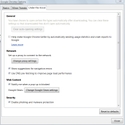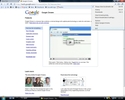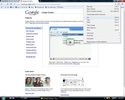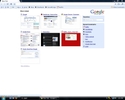First impressions: Google Chrome on Vista
Last updated Sep 2, 2008 — 7792 views With 90+ percent of my desktop computing conducted from within Firefox, and half the Internet services I use supplied by Google, the opportunity to test Google’s new “Chrome” browser was irresistible. Here are my first impressions.
With 90+ percent of my desktop computing conducted from within Firefox, and half the Internet services I use supplied by Google, the opportunity to test Google’s new “Chrome” browser was irresistible. Here are my first impressions.
I headed over to Google’s Chrome site to download the browser’s initial beta release, only to discover that it’s currently only available in a Windows version.
A few minutes after rebooting the Black Tower into Vista (it’s handy having Vista available for occasions like this), Chrome was download, installed, and in operation.
First impressions
My initial impressions? It looks very promising, if a bit incomplete.
Given that Chrome is based, in part, on some highly-mature open source components — such as Apple’s Webkit and Mozilla’s Firefox — Google didn’t have to completely reinvented the browser wheel. Consequently, the first beta seems quite usable right out of the chute. And, it’s lightening fast!
On the other hand, the beta lacks a number of must-have functions such as “Send Link,” and configuration options like the ability to customize web page fonts, colors, etc. (Of course, it may be that I simply didn’t manage to locate some of these options in my quick first look at Chrome.)
In any case, if Google is serious about advancing Chrome, I won’t be surprised if virtually everything I’ve come to depend on — and love — about Firefox eventually gets incorporated into the upstart browser, since they’re both open-source projects.
Screenshot tour
Below are an assortment of screenshots that capture some of my first impressions — click each for a larger view.










Google’s new Chrome browser beta on Vista
(Click each image for a larger view)
Why do we need a new browser, anyhow?
That’s the big question that hit me the moment I learned of Google’s Chrome beta browser release. Why a new browser? Why didn’t Google simply participate in — and contribute to — Mozilla’s Firefox project, instead?
I suspect the answer to that question is that well-established projects like Mozilla are governed by their own sets of priorities, and Google of course has its own — and its customers’ — interests to serve. Additionally, it’s difficult to get an established project to shift gears rapidly, whereas a new project has no inertia to overcome.
Here’s Google’s explanation for why it’s developing the Chrome browser:
“So why are we launching Google Chrome? Because we believe we can add value for users and, at the same time, help drive innovation on the web.
All of us at Google spend much of our time working inside a browser. We search, chat, email and collaborate in a browser. And in our spare time, we shop, bank, read news, and keep in touch with friends — all using a browser. Because we spend so much time online, we began seriously thinking about what kind of browser could exist if we started from scratch and built on the best elements out there. We realized that the web had evolved from mainly simple text pages to rich, interactive applications and that we needed to completely rethink the browser. What we really needed was not just a browser, but also a modern platform for web pages and applications, and that’s what we set out to build.
On the surface, we designed a browser window that is streamlined and simple. To most people, it isn’t the browser that matters. It’s only a tool to run the important stuff — the pages, sites and applications that make up the web. Like the classic Google homepage, Google Chrome is clean and fast. It gets out of your way and gets you where you want to go.
Under the hood, we were able to build the foundation of a browser that runs today’s complex web applications much better. By keeping each tab in an isolated ‘sandbox,’ we were able to prevent one tab from crashing another and provide improved protection from rogue sites. We improved speed and responsiveness across the board. We also built a more powerful JavaScript engine, V8, to power the next generation of web applications that aren’t even possible in today’s browsers.
I certainly can’t argue with these goals, although I assume the Mozilla Firefox project has similar ones.
On the other hand, I worry that the introduction of a new browser by the Big Internet Kahuna will further fragment the browser market and, as a result, slow or even reverse recent gains by Firefox over Internet Explorer.
With that in mind, it’s interesting to read Mozilla CEO John Lily’s thoughts on Chrome, posted today on his blog:
“…more smart people thinking about ways to make the Web good for normal human beings is good, absolutely. Competition often results in innovation of one sort or another — in the browser you can see that this is true in spades this year, with huge Javascript performance increases, security process advances, and user interface breakthroughs. I’d expect that to continue now that Google has thrown their hat in the ring.
It should come as no real surprise that Google has done something here — their business is the web, and they’ve got clear opinions on how things should be, and smart people thinking about how to make things better. Chrome will be a browser optimized for the things that they see as important, and it’ll be interesting to see how it evolves.
… How does this affect Mozilla? As much as anything else, it’ll mean there’s another interesting browser that users can choose. With IE, Firefox, Safari, Opera, etc — there’s been competition for a while now, and this increases that. So it means that more than ever, we need to build software that people care about and love. Firefox is good now, and will keep on getting better.
Well, time will tell. In general, I like some of what I’ve already seen in Chrome, as well as some of the planned enhancements, and can easily envision the best of both Chrome and Firefox eventually being combined to create world’s best — and most popular — browser.
Don’t miss the Google Chrome Comic Book
Meanwhile, Google has published an entertaining and informative “comic book” that summarizes the current goals of the new Chrome browser, and explains a few key technologies that are being developed to meet those goals. You can read the 40-page Chrome Comic Book here


“We are so, so happy with Google Chrome,” mumbled Mozilla CEO John Lilly through gritted teeth. “That most of our income is from Google has no bearing on me making this statement.” – http://notnews.today.com/?p=57
How about standards compliance? ACID tests?
Google’s Chrome is aimed at Windows, not IE
This is no longer about browser but about the an entire marketplace spread between desktop, mobile and web. With Chrome, Google’s taking a shot at Windows, not paltry Internet Explorer
I’ve covered this in more detail on my blog
http://sachendra.wordpress.com/2008/09/03/googles-chrome-is-aimed-at-windows-not-ie/
Reply to Sachendra Yadav:
I totally agree with your assessment of the merging of browser and desktop OS. Personally, as mentioned in the article, I spend nearly all my time (90+ percent) in Internet-centric apps and hardly use traditional (isolated) apps — like word processors, spreadsheets, etc. — any more. Quite simply, to paraphrase Sun, “the Internet has become the computer.” Google search/maps/news, google email/calendar, wikipedia, youtube, firefox/thunderbird… those are my desktop and mobile computing world. It hardly matters what OS is running the system any more, with the exception of that other 5-10 percent. So seen in this context, to the extent that Chrome will become a platform for delivering web applications to the desktop — both inside and outside of a (streamlined) “browser-style” window — Google’s new Chrome ‘browser’ make complete sense.
i’m finding Chrome’s speed to be inconsistent; it seems to alternate between going lightning fast and then hanging for no apparent reason…
> How about standards compliance? ACID tests?
I’ve read a blog entry (http://fieser-admin.de/it-news/google-chrome-acid-test-ergebnisse/) that states that ACID 1 and 2 are passed (100%), ACID 3 is an impressing 76%. The blog author seems to think that this is actually not much, but I think it’s quite impressive, given the fact that Chrome is still in beta, and the ACID 3 test is quite new (Feb. 2008). When running the test myself, Chrome scored 79%.
anyone havin probem with chrome and their firewall?
I don’t think that chrome and firefox can be easily integrated. Firefox is built on Gecko, Chrome is built on Webkit. Both have their advantages and disadvantages.
I have found chrome to be more than satisfying :D, it may even replace firefox as a favorite browser if it continues to beat my expectations. As for previous comments of hanging for no apparent reason, as annoying as that can be there is always the quick fix of, well.. crtl + r, happens in firefox too, i dont think its possible to complete avoid it. As for the missing Send Link Option, personally ive never really used that in any previous browsers and if i really had to share a link with someone i usually have a chat program of some sort open already to send to whomsoever i need to. From me chrome gets two enthusiastic thumbs up.
It’s a shame that even now (March 2009), it has an annoying bug that on Vista the title bar gets messed up after a while – 1-2 minutes after starting (the minimize, maximize, close buttons disappear for example) as your screenshots show.
A i’m at the bottom of the page and i can say that you put it best, i’m your everyday user and i’m getting better at this computer thing, and so far chrome was made for me the n/a guru. It was made for me because my front page wasn’t full of thing it didn’t need or know how to use google chrome was thinking of me, Google Chrome started over for the us like me’s. And the enter button rules.